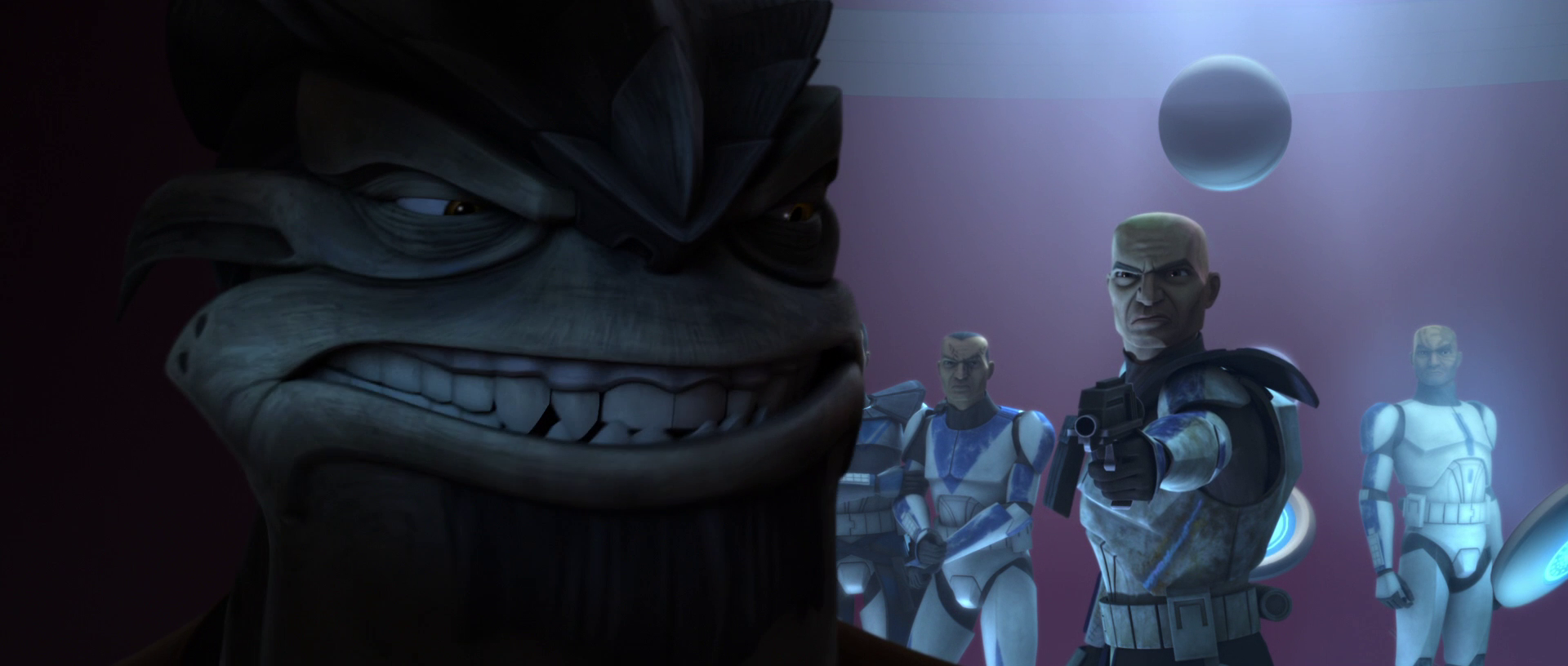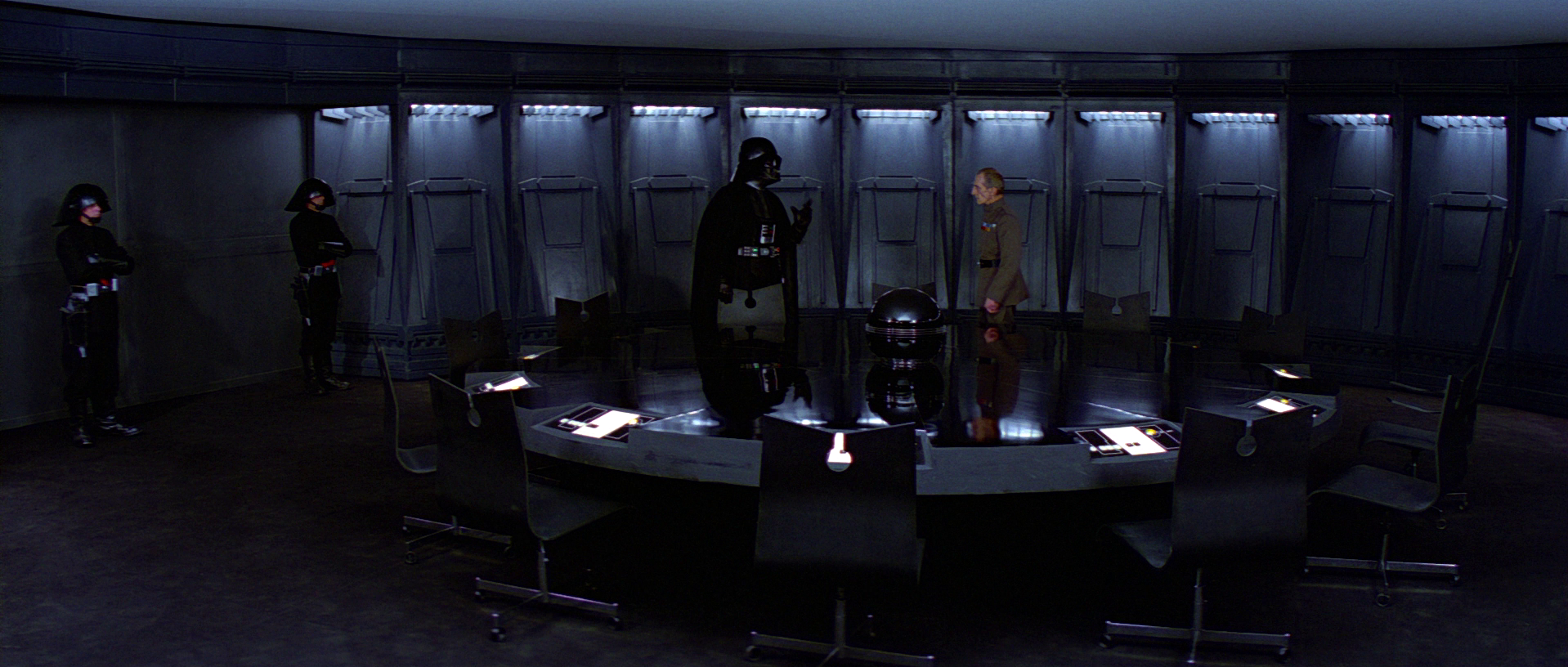Death penalty, or execution, was the practice of imposing the punishment of death for people convicted of certain serious crimes. Worlds with the death penalty usually counted treason as a capital offense. The Yavin Code declared that all prisoners set to be executed were to be blindfolded, but the code's regulations largely fell out of use as the centuries went by.
In the early Clone Wars, Jedi Master Prosset Dibs was found guilty of treason for attempting to murder fellow Jedi Master Mace Windu during the operation on Hissrich. Dibs, who had come to regard the Jedi as tyrants, expected his punishment to be death, but he was instead sentenced to rehabilitation at Windu's request.

Jedi General Pong Krell was executed for treason during the Battle of Umbara.
In the Grand Army of the Republic, insurrection was a court-martial offense punishable by arrest or even death. During the Battle of Umbara, Jedi General Pong Krell ordered the arrest of clone troopers Fives and Jesse for disobeying their commanding officer, knowing that they would be court-martialed, found guilty and consequently executed for treason. Later, however, he ordered the immediate execution of both clones after Clone Captain Rex tried to intercede. The captain initially complied with Krell's orders, since as a general, he had the authority to issue the death sentence during wartime. The execution was to be carried out by a firing squad, but the clones refused to comply. Krell was subsequently arrested by his troops for tricking the 501st Legion and the 212th Attack Battalion into fighting each other. Krell confessed to collaborating with the Umbarans, intending to become an apprentice to Count Dooku, and was ultimately executed as a traitor to the Galactic Republic by his most loyal trooper, the clone known as Dogma.
Later during the war, Jedi Padawan Ahsoka Tano was expelled from the Jedi Order and tried by a Republic court on charges of murder and treason. Tano had been framed in the bombing of the Jedi Temple hangar, and the prosecutor, Admiral Wilhuff Tarkin vowed to ensure Tano's conviction and advocated to apply the death penalty for the former Jedi, much to the latter's shock. Ultimately, the real traitor, Barriss Offee, was exposed before the court could render its decision on Tano. Tano was released from Republic custody, but chose to reject the Jedi Order's offer to rejoin their ranks because, with the exception of Anakin Skywalker, they had not stood by her.
During Anakin Skywalker and Obi-Wan Kenobi's mission to Utapau, Kenobi was taken prisoner by General Grievous aboard Grievous' DH-Omni Support Vessel. Two OOM-series security droids told Kenobi they were taking him from his prison cell to the "execution room," leading the Jedi Master to ask in surprise whether they had an entire room dedicated to conducting executions. Kenobi then informed the droids that the Yavin Code required that all prisoners must be blindfolded prior to execution, stalling for time as Anakin came to save him.
The Jedi Master Quinlan Vos fell to the dark side of the Force after being sent to assassinate Separatist leader Count Dooku. Faking reform, he returned to the Jedi Order and committed treasonous acts. As the Jedi High Council discussed his proposed punishment, Mace Windu floated the possibility of execution, which would have been an unprecedented step in the history of the Jedi Order. The possibility was seriously considered, but ultimately rejected, largely because of the arguments of Obi-Wan Kenobi. However, after a second betrayal, execution was considered all but certain, but ultimately events conspired to allow Vos to reform.
During its reign, the Galactic Empire often carried out capital punishment for major and minor offenses, with many convicts being hanged. Cassian Jeron Andor lost his adoptive father, Clem Andor, when he was hanged. When Commandant Jayhold Beehaz discovered his subordinate, Lieutenant Gorn, had joined a rebel infiltration team, he declared that Gorn would be hung for his treachery, but Gorn remarked that his years of carrying out Beehaz's orders had earned him a worse punishment.
In 4 BBY, the Imperial cadet Zare Leonis was made to attend a tribunal for suspected treason against the Galactic Empire. He pleaded guilty to all counts against him and was sentenced to be executed, but escaped before the penalty could be carried out and conducted a rescue of his sister.
By the secret mission to Tatooine, Doctor Cornelius Evazan had the death sentence on twelve star systems, and he told this to Luke Skywalker in Chalmun's Spaceport Cantina.

Grand Moff Tarkin, after learning that the rebel base on Dantooine was abandoned, planned to have Princess Leia Organa killed.
After Princess Leia Organa was captured by the Galactic Empire while ferrying stolen Death Star plans to Tatooine, Grand Moff Wilhuff Tarkin signed an order for her execution. Darth Vader, however, kept her alive in order to torture her for information regarding the stolen plans and Rebel Alliance base. After she was discovered to have given false information that the Rebel base was on Dantooine, Tarkin called for her immediate execution, but, after the Millennium Falcon arrived on the Death Star, Vader instead chose to permit her escape because he believed she would lead the Empire to the base.
The crime lord Jabba Desilijic Tiure executed those who provoked his prejudice by feeding them to the sarlacc. During the Rescue of Han Solo, Luke Skywalker, Han Solo, and Chewbacca were sentenced to that fate, but managed to overpower the guards set to carry out their executions.
In like manner, Rebel pilots were under orders to kill any Imperials who had served on the second Death Star.
After the Galactic Civil War and the conversion of the Galactic Empire to the New Republic, some Imperial officials were executed for war crimes. Agent Gideon of the Imperial Security Bureau escaped that execution.
However, after Gideon's arrest on his cruiser by Marshal Carasynthia Dune, it was said that the New Republic Tribunal was likely to sentence him to death again for his crimes.
In 28 ABY, Senator Ransolm Casterfo lent his support to a campaign to reinstate the death penalty on his homeworld of Riosa. At the time, more Centrist star systems were leaning toward it. Ironically, Casterfo ended up facing capital punishment after he was framed for the assassination of Tai-Lin Garr. Casterfo's execution, however, was never carried out and he was eventually rescued by the Resistance.

Traitors in the First Order were put to death by stormtrooper executioners.
Execution was the prescribed punishment for traitors within the ranks of the Stormtrooper Corps of the First Order. This task was carried out by those within the position of executioner trooper. These specialized stormtroopers were rotated via random duty shifts, rather than being a position held by any single group of individuals. As such, any stormtrooper could be assigned this duty, but it was never known who, as assignments were kept anonymous. Finn, a First Order defector once known as FN-2187, dreaded this task and spent his shifts on it fervently hoping the day would end without him having to perform any executions. His own defection later caused him and fellow Resistance operative Rose Tico to end up facing this fate, but the two were saved when the Resistance flagship Raddus crashed into the Supremacy, instantly killing their executioners.
- Star Wars Helmet Collection 2
- Star Wars Helmet Collection 5
- Star Wars Helmet Collection 14
- Star Wars Helmet Collection 16
- Star Wars Helmet Collection 19
- Star Wars Helmet Collection 19
- Star Wars Helmet Collection 19
- Star Wars Helmet Collection 22
- Star Wars Helmet Collection 45
- Star Wars: The Last Jedi: The Visual Dictionary